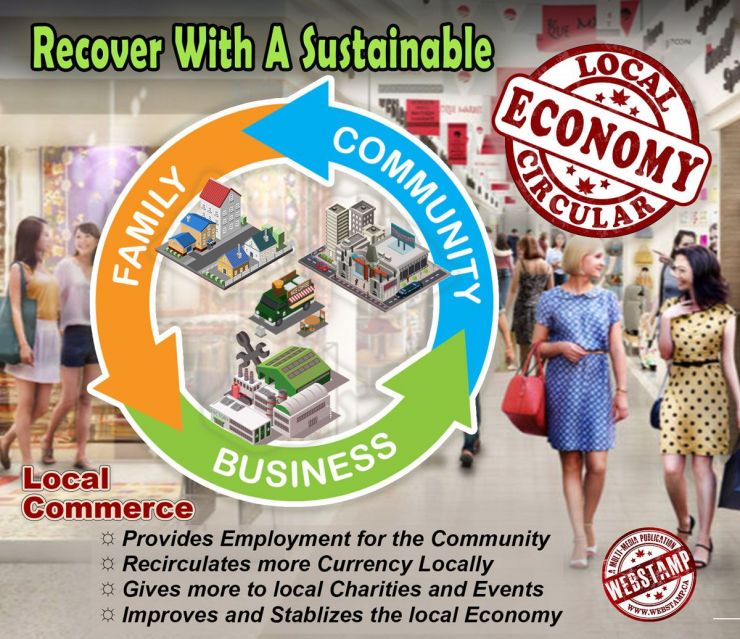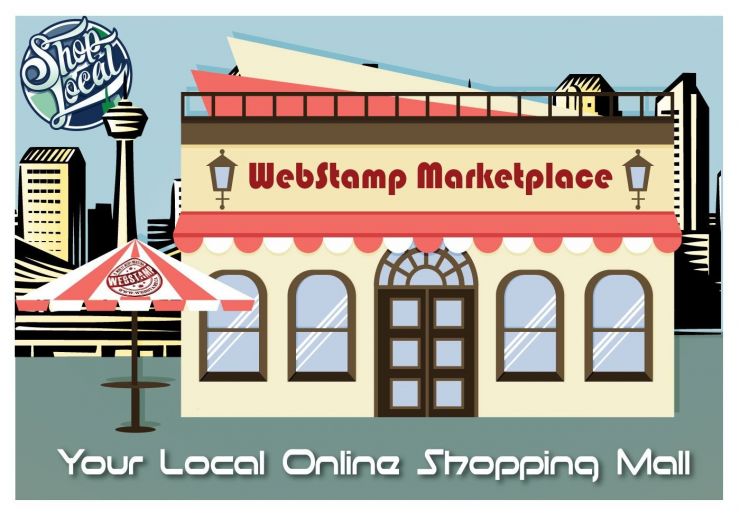WebStamp June 10, 2020
Payback With Local Commerce
Ever since international trade and globalization began expanding at the start of the 20th Century some form of the Buy Local Movement has existed. The first time that importing products were seen as a threat was during the First World War economy when a Buy Canadian Movement was introduced in 1914. The “Buy American Act” of 1933 required the U.S. government to prioritize buying American-made products. Over the last several decades' society is seeing the large economic impact that engaging in local commerce over procurement from outside sources can have.
Everyone is now encouraged to shop locally to help the economy recover to a New Normal from the COVID_19 pandemic. The strength of local and regional economies is dependant on sustainable local commerce and the well-being of its citizens and communities. If we are deeply committed to a sustainable lifestyle then society needs to embrace the concept of the Local Circular Business model.
Many advantages can be gained with Buying Local. It does not mean terminating the global market for there will always be items we cannot produce locally. Instead, it means becoming more self-sufficient and less dependent on volatile outside sources. Economic control should be returned to the community where it belongs and not run from the boardrooms of distant corporations and governments.
With the pandemic, purchasers are looking beyond simply cost but also are considering supporting the local community and the sustainability attributes of their purchases into their decisions.
They are facing many barriers to successfully rebuilding the collapsing economy. The process is hindered by the deficiency of resources, limited access to capital and capacity constraints. Also, there is a lack of awareness of the local economic benefits that they, as Small and Medium Businesses (SMBs), can bring to our communities and economy.
It is the local businesses that are owned by local citizens that provide employment for the community. Local SMBs tend to recirculate more money into our local economy and give more to local charities that help strengthen our social fabric than any outside sources could. Besides creating good local jobs buying more goods and services from other local businesses improves and stabilizes the local economy. The increased local economic activity and job creation will lead to greater tax revenue and a stronger economic base while also supporting other businesses and anchor institutions.
Rather than supporting existing or new SMBs, economic development usually offers incentives to large non-local corporations to attract them into the local economy. Yet, it was shown that developing small local businesses is more effective at creating employment than supporting foreign corporations in the Harvard Business Review and Journal of Urban Economics. Non-local companies and imports definitely are important to the modern economy but to provide significant benefits to the local and provincial economies we need to enable local companies to have a larger share of the local and regional markets.
Now that we are working on recovering the economy, we have to opportunity to make the changes necessary to build a better community. A larger local market will develop more local political participation for smarter growth, better public health, improved tourism attraction, and a stronger culture of entrepreneurship. Make A Difference to our future and reap the benefits of a stable economy, even in the times of crises.
Articles in this Issue
WebStamp June 10, 2020
References:
https://ccednet-rcdec.ca/en/toolbox/power-purchasing-economic-impacts-local-procurement
http://content.time.com/time/business/article/0,8599,1903632,00.html
https://www.opportunityfund.org/the-importance-of-sourcing-locally/
https://ced.msu.edu/upload/reports/why%20buy%20local.pdf
http://www.tradeready.ca/2016/trade-takeaways/face-off-buy-local-vs-buy-global/






